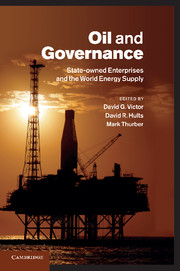1 - Introduction and overview
Published online by Cambridge University Press: 05 January 2012
Summary
Introduction
An array of state-owned entities – known as “national oil companies” (NOCs) – dominate the world’s oil and gas industry. Concentrated in the Middle East but also based in Africa, Europe, Latin America, and other parts of Asia, NOCs own 73% of the world’s oil reserves and 61% of production. (Their dominance in gas is similar – 68% of reserves and 52% of production.) In most segments of the world economy, state-owned enterprises (SOEs) have waned in influence, often due to government policies that favor privatization and competition. But in oil and gas (together known as “hydrocarbons”) the role of state enterprises is stronger than ever. This book looks at the origins and operations of NOCs, which are a major part of our global energy portfolio and a significant presence in the world economy. Our analysis of NOCs thus has important implications for global oil and gas markets and the shifting balance between market and state.
Despite the common name, “NOCs” play many different roles (see Box 1.1). A few are commercially minded entities little different from their private sector international oil company (IOC) counterparts. These NOCs, like Saudi Arabia’s Saudi Aramco or Norway’s Statoil, are highly profitable and in some cases worldwide operators themselves. Other NOCs carry many political and social functions alongside their commercial missions. These include Russia’s Gazprom – the world’s largest gas company and the Kremlin’s instrument of choice in the 2000s “gas wars” with the Ukraine – and Venezuela’s Petróleos de Venezuela, S.A. (PDVSA), which under President Hugo Chávez is the government’s primary agent for providing social services and nationalizing the domestic economy. Some NOCs perform functions that are normally left to government. Angola’s Sonangol, for example, is foremost a highly effective regulator of IOC operations within the country; its role as an oil producer is secondary.
- Type
- Chapter
- Information
- Oil and GovernanceState-Owned Enterprises and the World Energy Supply, pp. 3 - 32Publisher: Cambridge University PressPrint publication year: 2011
- 2
- Cited by



